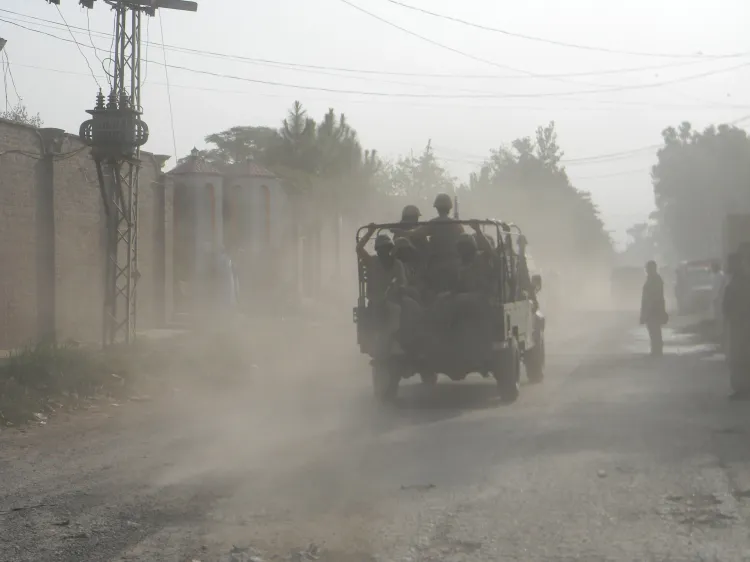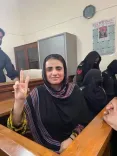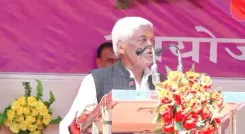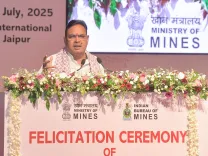Is Balochistan Facing State-Supported Disappearances and Executions?

Synopsis
Key Takeaways
- Balochistan is facing a troubling rise in disappearances and executions.
- Daesh-linked militias operate with apparent state protection.
- Militias have been used to suppress Baloch nationalism.
- Families of the missing persist in their fight for justice.
- The situation reflects a broader pattern of political manipulation in Pakistan.
London, Sep 11 (NationPress) Daesh-associated terrorist organizations and sectarian militias are reportedly functioning under the protective umbrella of the state in Balochistan, Pakistan. A recent investigation has disclosed that Daesh has openly recognized its havens in Khuzdar and Mastung.
Since 2008, the province has seen a disturbing trend of disappearances and executions, a strategy denounced by critics as "kill and dump".
According to the report, instead of dismantling these extremist strongholds, Pakistan's leadership has allegedly repurposed them for political gain. Militants who once targeted Shias have been redirected to suppress Baloch nationalists and silence dissenting voices. These sanctuaries offered not just protection but also training camps, recruitment networks, and financial support that allowed extremists to expand their influence both within the province and beyond. Evidence links these camps to suicide bombings in Sindh and the massacres of Hazara Shias in Quetta, illustrating that Balochistan's militancy is interconnected with a wider national terror infrastructure, as detailed in a report by The Milli Chronicle.
A significant figure in this narrative is Shafiq Mengal, the son of former Balochistan Chief Minister Naseer Mengal. After his education at Aitchison College, he became involved with a Deobandi seminary and established connections with Lashkar-e-Taiba (LeT). He founded the Musalla Diffa Tanzeem, a militia notorious for abductions, torture, and extrajudicial killings. His death squads targeted activists, students, and poets advocating for Baloch rights, operating with alarming impunity.
As noted by London-based columnist Omer Wazir, death squads like Mengal's were crucial to executing this strategy for the state. A grenade attack on a Baloch Students Organization (BSO-Azad) rally in 2010 marked the beginning of targeted assaults on cultural events, leading to numerous casualties among young participants. The abduction and execution of minors, such as Balaach and Majeed Zehri, intensified the atmosphere of fear. Each incident further solidified the belief that Pakistan's security apparatus had outsourced its dirtiest operations to extremists, allowing the Army plausible deniability while instilling terror in Baloch civil society.
Lawmakers, including Sardar Akhtar Mengal, have accused the Pakistani Army of arming and safeguarding militias to suppress nationalist movements, with complicity extending to political elites. The Caretaker Interior Minister of Balochistan, Sarfraz Bughti, has faced allegations of maintaining his own militia, showcasing the deep intertwinement of politics, militancy, and military support.
Families of the missing, holding photographs of their loved ones who disappeared at the hands of militias or security forces, frequently gather in Quetta and other locales, seeking the release of their kin. Their peaceful protests often face indifference or outright oppression.
Demonstrations in Islamabad calling for accountability have also been suppressed, highlighting the hypocrisy in Pakistan's claims of democratic governance. Civil society remains trapped between the violence of the Army and the extremism of militant groups. While families demand justice, organizations like Daesh and Mengal's militias operate with apparent freedom, enjoying access to weapons, vehicles, and funding. The situation in Balochistan serves as a stark reminder of how states can manufacture and weaponize extremism for their political objectives. The presence of Daesh in this province is not just about sectarian strife; it represents a broader strategy of political manipulation and state-supported terror, as noted in the report by The Milli Chronicle.








